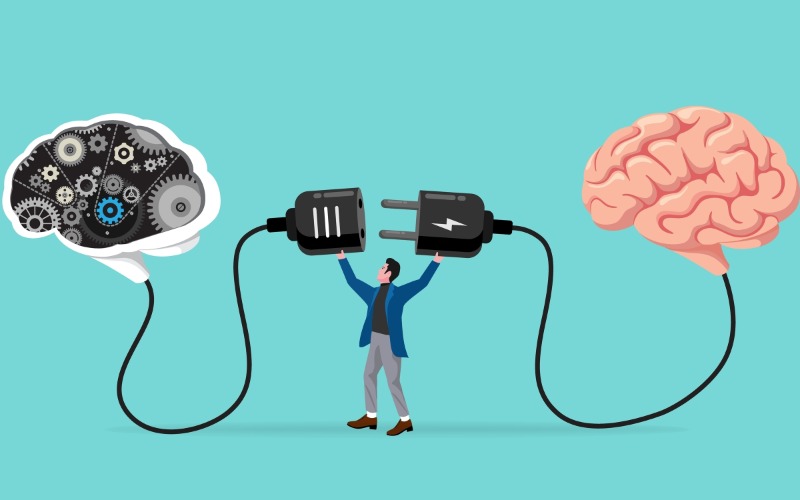Generative artificial intelligence (GenAI) has been a hot-button topic in product marketing circles for several years. While some companies have embraced the technology, others are experimenting cautiously. Meanwhile, some product marketers worry that GenAI may replace their roles. In a 2023 study by Marketing AI Institute, 40 percent of respondents said AI will eliminate more jobs than it creates over the next three years. However, the truth about using GenAI in product marketing is much more complicated.
It’s important to recognize that this technology is a tool that enhances, rather than replaces, the multifaceted role of a product marketer. Think of GenAI as an enthusiastic, quirky colleague. They have many new ideas but need human guidance to be effective. Consequently, a strategic approach is required to balance the benefits of GenAI with the human creativity and ingenuity that form the foundation of product marketing.
GenAI Is Complementary, Not Competition
GenAI enhances the capabilities of product marketers, establishing it as a collaborative tool rather than a competitor. Recent advancements have introduced a wide array of GenAI tools and made them broadly accessible. With the proliferation of these advanced tools, marketers must choose one that best aligns with their specific needs to fully leverage GenAI’s potential. For example, AI-driven tools like Poe by Quora and ChatGPT offer deep insights into market trends and customer behaviors when used with intelligent prompts, enhancing strategic marketing efforts. These tools aid in brainstorming creative content, refining campaign ideas, and producing high-quality visual materials, as seen with Midjourney’s photorealistic images.
Moreover, AI technologies such as 6Sense and Salesforce Einstein are crucial in enhancing customer segmentation and lead scoring, directly supporting targeted marketing campaigns. Tools like Persado have also shown their effectiveness, as seen in craft giant Michaels’ increased customer engagement and conversion rates through personalized communication. When Michaels increased email personalization from 20 percent to 95 percent, it experienced a 25 percent lift in click-through rate. When it applied the same strategy to SMS campaigns, it increased engagement by 41 percent.
Another way GenAI can benefit product marketers is by increasing their efficiency and productivity. A 2023 MIT study revealed that GenAI tools like ChatGPT can slash routine writing tasks by 40 percent, enabling marketers to focus on more strategic activities. This underscores GenAI’s role as a supportive technology in marketing, proving that it is an ally, not a rival, to product marketers.
The Risks of Using GenAI
The use of GenAI in product marketing has great potential to transform the industry, but it also presents significant risks that must be considered. Marketers using this tool should exercise caution and be fully aware of the associated risks, such as cybersecurity threats, data breaches, misinformation, and copyright and legal challenges.
Cyberattacks and data breaches compromise sensitive information and pose a significant financial burden, with the average cost of a data breach reaching $9.48 million in the United States. This technology raises other complex copyright issues, particularly when using AI-generated materials in marketing assets. If the AI reproduces copyrighted material without authorization or attribution, there may be legal ramifications for marketers or other stakeholders. As copyright challenges make their way through courts, there will be new policies and laws in the future.
Product marketers must use AI tools judiciously to effectively manage these risks with proper cybersecurity safeguards and protocols in place. To avoid potential legal issues, stakeholders must ensure that human creativity and oversight guide every aspect of their content.
“DARE” to Balance Human Creativity With GenAI
Implementing GenAI can benefit teams if the right approach is taken. The “DARE” framework is a strategic methodology designed to integrate human creativity with the capabilities of GenAI in product marketing. It acknowledges that while AI can significantly enhance marketing efforts, it is not a magic cure-all for all marketing challenges. Here’s an elaboration on each component of the DARE framework:
- Define. To effectively use AI tools in marketing, it is essential to define clear roles and objectives for GenAI and human team members. This includes identifying which tasks are ideal for AI, such as data analysis and pattern recognition, and which require human oversight, such as strategic decision-making and creative content ideation.
- Augment. This stage focuses on leveraging AI to augment human capabilities, not replace them. GenAI can handle large-scale data processing and automate repetitive tasks, which frees up marketers to focus on more complex and creative aspects of strategy. For example, AI might generate content drafts or trend-based insights while humans refine this output to align with brand voice and goals.
- Refine. As AI systems generate outputs, marketers must refine these results to ensure effectiveness. This refinement process may include editing AI-generated content to better align with brand voice, interpreting AI-driven analytics to meet broader marketing objectives, and providing feedback to adjust AI models based on performance.
- Evaluate. Regularly evaluate the integration of AI tools with human efforts, assessing their effectiveness and the dynamics of collaboration. Adjust strategies and tools to ensure responsiveness to market changes and alignment with marketing objectives.
Organizations can adopt the DARE framework to promote a harmonious symmetry between human ingenuity and AI’s technical prowess.
The Future of GenAI in Product Marketing
As GenAI increasingly permeates marketing, it poses significant questions about how to best balance its technological benefits with essential human elements. Product marketers need to approach AI with an open mind and deepen their understanding of these technologies to identify applications that enhance marketing strategies without compromising ethical standards or security. Despite advancements in AI, human skills such as strategic thinking and creativity remain essential. The unique ability of humans to evoke emotions, tell compelling stories, and cultivate deep connections with audiences remains fundamental to marketing success. By viewing GenAI as both a technological tool and a strategic element, product marketers will be well-equipped to confidently navigate the future of human-AI teamwork.










